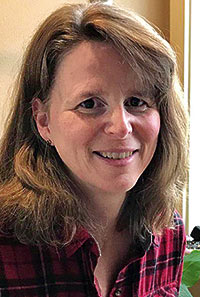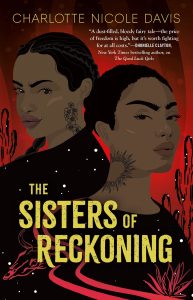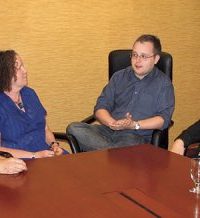The Year in Review 2021 by Colleen Mondor

Of the three dozen books I reviewed for Locus last year, there were a few that particularly stood out. Because last year was, well, such a year, I’m afraid some of them might have been overlooked, and taking advantage of my chance here to shine the spotlight a little brighter on those I think might have been missed.
Femi Fadugba’s The Upper World introduces Esso, who is having the worst week of his life. He’s about to be kicked out of school, he’s inadvertently become the spark in a neighborhood gang war that threatens to envelope several of his friends, (including those who belong to rival gangs), and the adults in his life are exhibiting a colossal inability to grasp the seriousness of the situation. But just as readers immerse themselves in Esso ‘‘today,’’ they are introduced to Esso 15 years later, as a mathematics tutor for Rhia. This Esso has an ulterior motive, which he slowly reveals in a series of lessons that lead Rhia to discussions on time travel. The lessons, artfully imparted by Fadugba, who has published papers on quantum physics, are the secret weapon in this compelling title. The time travel makes sense, Esso is a thoughtful and nuanced protagonist, and along with the pitch-perfect tension of his dreadful week, The Upper World is a smart and exciting read.
Kirsten Miller’s Don’t Tell a Soul is a creepy ghost story/murder mystery that is built around one determined teen forced to challenge a ton of gaslighting. Bram is fleeing something terrible that happened back in New York City, and seeks sanctuary with her uncle, who lives in a haunted house in the buttoned-up town of Louth. Getting to the bottom of what happened in the house is a good diversion for Bram, but asking questions and following leads ends up uncovering a host of ‘‘Dead Girl’’ stories that the town seems to take a little bit too much in stride. The twists and turns in this thriller lead Bram to darker and darker places as she tenaciously clings to her commitment to find the truth. Are there ghosts? Maybe, but more importantly there are the people who dismissed what the dead girls had to say when they were alive, and for Bram, that’s a serious problem that cannot be ignored no matter how terrifying things get.
 The first good thing about Shaun David Hutchison’s A Complicated Love Story Set in Space is that it’s set in space. (There are never enough YA titles set in space.) The whole opening scenario is brilliant, with a teen suddenly waking up in a space suit tethered to a mysterious ship with no idea how he got there. From there it only gets weirder as he and two others find themselves thrust together, discover they don’t know where they are, can’t control where they are going, are stuck with some really appalling entertainment options, and the immense tedium of daily life in the spacecraft is spiked with sudden moments of sheer terror where everything goes to hell in a hand basket. I was initially suspicious of Hutchison’s ability to hold this plot together and balance the drama and humor, but as I settled in to enjoying where the plot (and engaging characters) were taking me, I found that he knows exactly what he is doing and delivers big time in the final chapters. He’s now one of my authors to watch.
The first good thing about Shaun David Hutchison’s A Complicated Love Story Set in Space is that it’s set in space. (There are never enough YA titles set in space.) The whole opening scenario is brilliant, with a teen suddenly waking up in a space suit tethered to a mysterious ship with no idea how he got there. From there it only gets weirder as he and two others find themselves thrust together, discover they don’t know where they are, can’t control where they are going, are stuck with some really appalling entertainment options, and the immense tedium of daily life in the spacecraft is spiked with sudden moments of sheer terror where everything goes to hell in a hand basket. I was initially suspicious of Hutchison’s ability to hold this plot together and balance the drama and humor, but as I settled in to enjoying where the plot (and engaging characters) were taking me, I found that he knows exactly what he is doing and delivers big time in the final chapters. He’s now one of my authors to watch.
I was intrigued by the technology in Liselle Sambury’s near-future Blood Like Magic, but it was the long tradition of magic, and the world building surrounding the several interconnected families that possessed the powerful magic, that captivated me. Voya’s story is as much about family drama (amongst the many living members she shares a house with, plus their powerful ancestors) as it is about the tech that propels the dark choice she finds herself forced to make. There are all sorts of relationship dynamics to unpack in this intense novel, and it ends up being, far more than anything else, about the unique love, trust and disappointment that only family can bring. But the magic, and the power it holds over everyone’s lives, is the game changer that propels the novel’s unstoppable plot. The sequel, Blood Like Fate, is due this summer, and I’m looking forward to it.
The Sisters of Reckoning by Charlotte Nicole Davis is the second book is the Good Luck Girls duology. Set in an alternate world reminiscent of the 19th-century American west, the sequel ratchets up the tension by taking protagonist Aster and company directly into war with the region’s greedy racist overlords and the racist system that supports them. By bringing together all of the various groups from the first book, the sequel raises the stakes in a major way. It’s not just about rescuing a few girls from the ‘‘welcome houses’’ (AKA brothels) anymore, this time it’s about taking down the entire system and obliterating the society that has embraced its existence. While both exciting and action-packed, both books give the reader a lot to think about and many characters to embrace.
Despite the fact that there is a very big werewolf problem at the center of Kristin O’Neill’s Lycanthropy and  Other Chronic Illnesses, this surprisingly funny novel ends up being more about friendship than the problems a full moon can bring. It is Priya who figures out that her friend Brigid, a stalwart member of their online chronic illness forum, is suffering from a sickness that is far beyond what any of the others have experienced. After tracking her down and enlisting the assistance of a very necessary animal control officer, they set out to find a way to get Brigid through the ups and downs of lycanthropy. The way in which the other forum members are woven into the narrative, along with the extraordinarily human way in which lycanthropy is addressed, made this title my most surprising read of the year.
Other Chronic Illnesses, this surprisingly funny novel ends up being more about friendship than the problems a full moon can bring. It is Priya who figures out that her friend Brigid, a stalwart member of their online chronic illness forum, is suffering from a sickness that is far beyond what any of the others have experienced. After tracking her down and enlisting the assistance of a very necessary animal control officer, they set out to find a way to get Brigid through the ups and downs of lycanthropy. The way in which the other forum members are woven into the narrative, along with the extraordinarily human way in which lycanthropy is addressed, made this title my most surprising read of the year.
Finally, How Do You Live? by Genzaburō Yoshino is not science fiction or fantasy but the first English translation of this 1937 Japanese children’s classic. It was released last fall with an introduction from Neil Gaiman and is the basis for Hayao Miyazaki’s current film project. I think it is thus safe to assume that How Do You Live? will likely appeal to many Locus readers, and as it continues to resonate with me, I had to include it in my year in review.
How Do You Live? is the story of 15-year old Honda ‘‘Copper’’ Jun’ichi growing up in Tokyo. Along with his three close friends, Copper navigates a world of social minefields while dealing with the threat of physical trauma from a group of bullying older boys at his school. With each step in this coming-of-age odyssey, the boys find their way to a deeper, more meaningful friendship, and Copper discovers just what kind of person he wants to be. His chapter-long adventures alternate with excerpts from his uncle’s notebook, presented as letters to Copper, expanding on the boy’s latest experiences. The journal entries take on the appearance of philosophy lessons, which Copper embraces and then uses to make decisions and recover from his own mistakes.
As Gaiman elucidates in his introduction, in the midst of all this learning about history and science and how to make tofu, among many other things, readers ‘‘learn how to ask the next question.’’ That might seem like something small, but Yoshino shows it is actually a huge part of what it means to be human, especially in times when far too many people choose to ask nothing. In a brief afterword, translator Bruno Navasky provides information on the author and his life that makes the book even more significant. How Do You Live? is both a poignant story of growing up and a powerful message about how we choose to navigate the world. Miyazaki’s movie is likely to be amazing and should bring a host of new western readers to this wondrous book.
Colleen Mondor, Contributing Editor, is a writer, historian, and reviewer who co-owns an aircraft leasing company with her husband. She is the author of “The Map of My Dead Pilots: The Dangerous Game of Flying in Alaska” and reviews regularly for the ALA’s Booklist. Currently at work on a book about the 1932 Mt. McKinley Cosmic Ray Expedition, she and her family reside in the Pacific Northwest and Alaska. More info can be found on her website: www.colleenmondor.com.
This review and more like it in the February 2022 issue of Locus.
 While you are here, please take a moment to support Locus with a one-time or recurring donation. We rely on reader donations to keep the magazine and site going, and would like to keep the site paywall free, but WE NEED YOUR FINANCIAL SUPPORT to continue quality coverage of the science fiction and fantasy field.
While you are here, please take a moment to support Locus with a one-time or recurring donation. We rely on reader donations to keep the magazine and site going, and would like to keep the site paywall free, but WE NEED YOUR FINANCIAL SUPPORT to continue quality coverage of the science fiction and fantasy field.
©Locus Magazine. Copyrighted material may not be republished without permission of LSFF.







